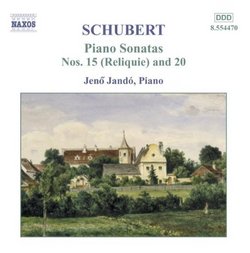| All Artists: Schubert, Jando Title: Piano Sonatas D. 959 & D. 840 Members Wishing: 0 Total Copies: 0 Label: Naxos Release Date: 9/17/2002 Genre: Classical Styles: Chamber Music, Historical Periods, Classical (c.1770-1830) Number of Discs: 1 SwapaCD Credits: 1 UPC: 636943447024 |
Search - Schubert, Jando :: Piano Sonatas D. 959 & D. 840
 | Schubert, Jando Piano Sonatas D. 959 & D. 840 Genre: Classical
|
Larger Image |
CD Details |
CD ReviewsMasterful Schubert, glorious performances J Scott Morrison | Middlebury VT, USA | 09/19/2002 (5 out of 5 stars) "The A major sonata, D. 959, is one of Schubert's masterpieces, and it's a late piece for him. But he wrote it when he was only 28 and had only three years to live. What might he have written if he had lived longer! The "Reliquie" sonata, D. 840, only two movements, languished in a drawer until Schubert's brother gave it to Schumann in 1839. It was finally published in 1861. It is only half a notch less superb than the A major.Jenö Jandö is Naxos' dogsbody pianist; he's recorded hours and hours of music for them. He's apparently working on a complete traversal of Schubert's piano music. It is to his artistic credit that he has not flagged, either in energy or in musical integrity. He does not have to take a back seat to the group of eminent Schubertians that include Schnabel, Brendel and Richard Goode. These performances are outstanding. They are mainstream, not quirky or showy; the emphasis is on the long line and the architecture of the music. As to the works themselves, they're so well known that they really need no description. The slow movement of the A major is right up there with Beethoven's late-sonata slow movements, and I'll add my own opinion that the main melody of the A major sonata's fourth movement, the rondo, is one of Schubert's most delicious; one is always glad when it comes back, even when it is varied and decorated. The sound is clean and true.This is an easy recommendation." Superbly played Schubert sonatas Hexameron | 02/17/2007 (5 out of 5 stars) "Jeno Jando has tackled a lot of repertoire for Naxos. He has a multitude of recordings in his name, ranging from Bach to Liszt. I'm not acquainted at all with his Beethoven recordings, but his blockbuster Liszt interpretations were convincing enough for me to recognize him as both a prolific and talented pianist. I am now venturing into his Schubert series and I must proclaim my astonishment at how well he plays these sonatas.
Schubert's D. 959 (No. 20 in A major) is arguably Schubert's greatest piano sonata, and one of the best in the repertoire. While Beethoven's 32 will never be surpassed, there is still a fine Hall of Fame for the sonatas that followed in their wake. Schubert's last three sonatas are his last legacy, but they could have been the start of a great line had he lived longer. In the D. 959 we find a structurally perfect composition. Each movement is motively connected. The first, second and last movement's opening bars are remarkably similar, as are the inflections of the themes. Through Jeno Jando's prowess and sensitivity the herculean first movement becomes a rousing 15 minutes of noble music. Jando has an affinity for playing these kinds of movements with a pleasing Classical fire. So it's mindblowing to hear Jando's heartaching performance of the Andantino, a movement of such pathos and profundity, it transcends Classicism. Jando feels every bar and crisply articulates the despairing treble notes and the gloomy accompaniment. The central agitated section is then played with a satisfying anger and sense of brooding. My only gripe is Jando's lack of legato in the recovering tender section that follows (5:39). In the Scherzo, Jando plays with brio and demonic glee. Then at once, he plays the ravishingly beautiful Rondo with an inspired heroism. (Anyone notice that the USA channel sitcom, "Wings," stole this Rondo theme for their opening credits?) Jando's total execution contains a splendid mixture of grandeur and tenderness. In this magnificent masterpiece of a sonata, Jando joins the ranks of the best of the best here as a true champion of Schubert. It's quite difficult for any piece to follow after the colossal D. 959 and still be impressive with equally extraordinary music. While the D. 840 'Reliquie' sonata (No. 15 in C) is not on par with the D. 959, it might have been, had it been finished! This sonata is a vastly potent and brilliant one, even when it only has two movements to stand on. The first Moderato movement sounds exotic with its hocketed theme, and Jando is once again in his prime, especially when the rapturous second theme comes along. Jando has a passionate understanding of the drama that is inherent in this work; his touch is remarkable for its immaculate suppleness and robust forcefulness. In the second (and last) movement, Jando cultivates a lyrical and introspective mood. He generally plays with a well-balanced dynamic touch, luring us gently into silence or suddenly erupting with passion. This sonata is among Schubert's finest piano works, even though it seems like a mere hatchling when placed next to the mature entity of the D. 959. Bottom line: Schiff, Brendel, Perahia, Kempff... This illustrious gang has recorded their share of Schubert sonatas, but Jando is just as notable for the muscular and spirited attributes he possesses when playing this wondrous music of Schubert." |

 Track Listings (6) - Disc #1
Track Listings (6) - Disc #1